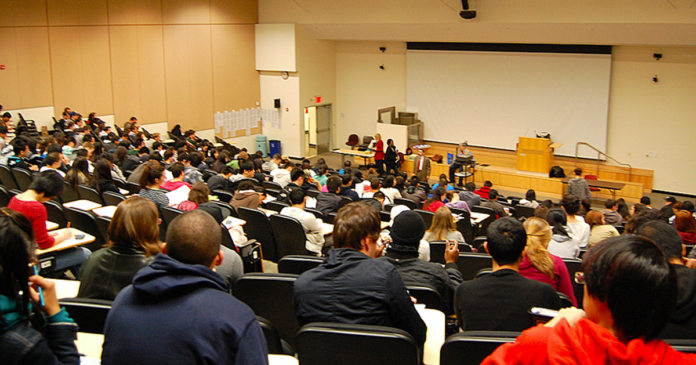In an age where university campuses are dominated by the forces of woke, some young Canadians are choosing to identify as “conservative” in face of the left-wing political status quo.
According to a recent Center for the Study of Partisanship and Ideology report, 73 per cent of academics from Canadian universities identify as “left-wing.” Further to this, 80 per cent of conservative Canadian scholars feel “hostility” towards their beliefs on campus.
For many of them, this leads to self-censorship.
A self-identified conservative since high school, Amanda is uncomfortable sharing her political beliefs on campus.
“There’s a prevailing liberal mindset among my peers and some professors, and my views are often in the minority,” said Amanda, 19, a second year York University student and self-identified conservative. “I find myself putting on a facade whenever I am on campus because I feel as though my opinions will be rejected, and it will be more difficult to make positive connections with my peers. I don’t make my views and opinions known in the classroom, out of fear of them being dismissed.”
Amanda confessed that concealing her views can be good for marks.
“I find completing assignments for left-leaning professors easy as it is easy for me to virtue signal liberal ideas for grades,” she said.
Others, like recent University of Toronto computer science graduate Nick Ruiz, rejected this approach.
“I strongly disbelieve with hiding your conservatism,” Ruiz said. “That is not to say you spill out all your beliefs to your coworkers and permanently turn them off to the idea, but I just think the cognitive dissonance with trying to change your personality to conform to what others say is a futile and useless effort unless you are willing to seriously compromise your beliefs. At work, I am fully expecting to hear things I may have to fight back against.”
Despite the prevailing Liberal mindset on university campuses, recent polling suggests that Pierre Poilievre and the Conservatives are appealing to young voters between the ages of 18 and 34, leading with 46.5 per cent of the vote. The momentum is credited to an ideological pendulum swing.
Some of these Conservative-supporting students end up participating in the Conservative Party of Canada’s long-running summer internship program. One of these is Joel, an outspoken “fiscal and social conservative” going into his final year of law school.
Joel is particularly passionate about pushing back against Canada’s “pro-death culture,” specifically the expansion of assisted suicide.
“In the near future, I suspect that offering Medical Assistance in Dying (MAiD) to babies and mature minors will become normalized,” he said. “This murderous practice is a gross violation of the right to life and sadly feels inevitable…. I do not think there is one solution that will fix it. It requires many solutions, such as educating the Canadian public about MAID, encouraging political and religious organizations to speak up, writing letters to MPs, peaceful protests, and so on.”
Joel said his political identification stems from his family’s origins.
“My parents grew up in a corrupt socialist country that kept many of its citizens poor and without freedom,” said Joel. “When my parents moved to Canada, they made sure that I did not buy into the socialist agenda that is often pushed by the media and by our universities.”
Amanda is hopeful that conservatism will ultimately win.
“I choose to remain a conservative despite the liberal cultural and political landscape because I believe that there is value in truth and tradition,” she said. “Far-left liberalism has gone too far, and I will always turn to truth and tradition to lead our society down the right path.”
This appeal to tradition was familiar to Isaac Leclerc, an 18-year old parliamentary assistant to Conservative MP Jeremy Patzer. Leclerc credits his political beliefs to his upbringing on his grandparents’ farm in rural Casselman – a francophone village just east of Ottawa.
“Something I particularly appreciate about conservatism is the preservation of heritage and cultural values,” said Leclerc, who will be studying economics at the University of Ottawa in the fall. “Growing up as a francophone in Ontario, the atmosphere around the French language was almost militaristic, and it had to be. With English dominating the media and an anglophone province, French would soon be relegated to Quebec without a concerted effort to preserve our language and culture. This fits right in with the conservative idea that the traditions and values of our past are worth preserving.”
Ruiz, the computer science graduate, said authenticity is key no matter what.
“The upside of not compromising your beliefs is worth the extra effort it takes to slowly and thoughtfully engage with others in a meaningful way that doesn’t turn them off to what I believe to be ultimately true about our human experience.”
